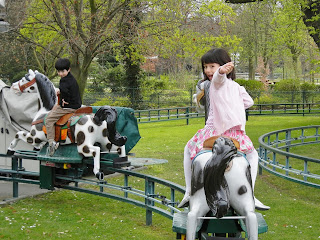We learned that to be able to live in France for a year you need a Visa de Long Séjour, a “long-stay” visa. We'd seen on the French consulate's website that among the requirements for our visas was proof of accommodation in France. So even though the normal order of things would be to rent an apartment after we had our visas, we actually needed to have an apartment to request our visas. And then hope that you´d actually get the visas. A risky juggling act, but the only option was to take the risk.
Fortunately there was a way out of all that. Since we wanted a furnished apartment, and we just needed a 10½-month lease, we looked at the long-term vacation rentals, which there are plenty of in Paris. Since we wouldn't have a car, we wanted to be within a 15-minute walking distance from the kids' school. That made our search quite easy since we were able to focus on a very specific area of Paris.
Luckily we found a place that met most of our requirements and was about a 10-minute walk from school. It was a three-bedroom, two-bathroom apartment with separate living and dining rooms and kitchen. It was located on Avenue de Wagram, in the 17th arrondissement, near Place des Ternes, the Arc de Triomphe and Blvd. de Courcelles. Although we were only able to see it in pictures, it looked great, and we hoped there would be no surprises when we got to Paris.
With a legal rental contract in hand, we still needed to make travel arrangements as well as work on all the other documentation required by the French embassy.
From what we'd heard and read, finding a decent apartment in Paris is not easy if you're on your own and you take the traditional route. You have to put together a thick dossier—a portfolio, so to speak. Typical things like pay stubs, a letter from your employer, paid utility bills, tax receipts, identification, letters of recommendation, and so on. Anything that will make you look like a qualified candidate. Probably in triplicate and with accompanying translations.
Fortunately there was a way out of all that. Since we wanted a furnished apartment, and we just needed a 10½-month lease, we looked at the long-term vacation rentals, which there are plenty of in Paris. Since we wouldn't have a car, we wanted to be within a 15-minute walking distance from the kids' school. That made our search quite easy since we were able to focus on a very specific area of Paris.
Luckily we found a place that met most of our requirements and was about a 10-minute walk from school. It was a three-bedroom, two-bathroom apartment with separate living and dining rooms and kitchen. It was located on Avenue de Wagram, in the 17th arrondissement, near Place des Ternes, the Arc de Triomphe and Blvd. de Courcelles. Although we were only able to see it in pictures, it looked great, and we hoped there would be no surprises when we got to Paris.
With a legal rental contract in hand, we still needed to make travel arrangements as well as work on all the other documentation required by the French embassy.





















